At Askwith Primary School, we recognise the importance of an inclusive, high quality education for all children. The Early Years Foundation Stage Framework (EYFS Framework) sets the statutory standards for the development, learning and care of children from birth to age five.
There are four overarching, guiding principles stated in the EYFS Framework which shape early years practice at Askwith Primary:
- every child is a unique child, who is constantly learning and can be resilient, capable, confident and self-assured
- children learn to be strong and independent through positive relationships
- children learn and develop well in enabling environments with teaching and support from adults, who respond to their individual interests and needs and help them to build their learning over time. Children benefit from a strong partnership between practitioners and parents and/or carers
- learning and development is very important. Children develop and learn at different rates
Knowledge in EYFS
- There are 7 areas of learning in the EYFS and these are split into the 17 Early Learning Goals that the children will progress towards in their early education and then be assessed against at the end of the Reception year
- Knowledge in the EYFS refers to the understanding and application of the prime areas (3) and specific areas (4) of learning. All areas of learning are planned out and taught in a systematic way, to build knowledge through small steps, at the appropriate time in the year. The prime areas provide the foundations for children’s learning and development and these are strengthened through the specific areas of learning
How is knowledge built in EYFS?
During focus sessions:
- connected knowledge is checked
- teach new knowledge in small steps
- deliberately practise connected knowledge and new knowledge
- check that knowledge is being built
During continuous provision areas:
- language rich to develop vocabulary knowledge
- include:
- learning (question based on Bloom’s Taxonomy) prompts to support high quality interactions
- key vocabulary
- phonically decodable books/words for reception
- picture books for nursery
- ‘Ask me’ books
- labels for organisation (images/words depending on phase)
Enhanced provision (planned within continuous provision) to:
- meet children’s ongoing needs through high quality adult interactions
- support learning of new knowledge
- deliberately practise connected/new knowledgefrom focus sessions
